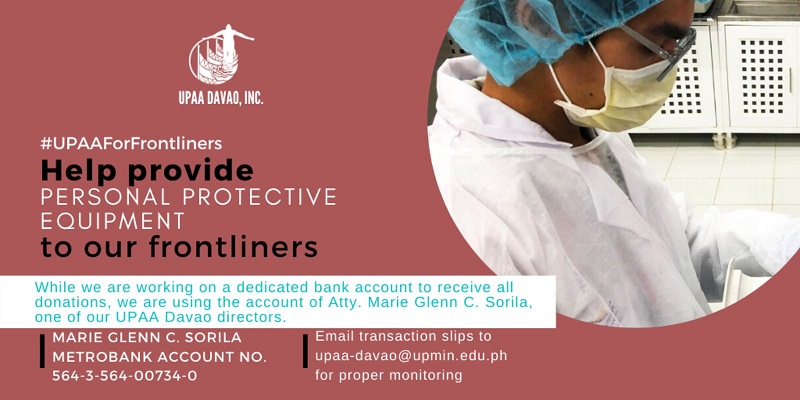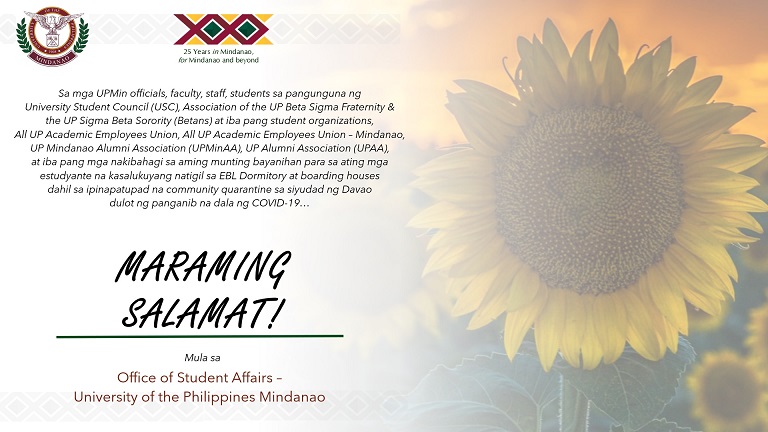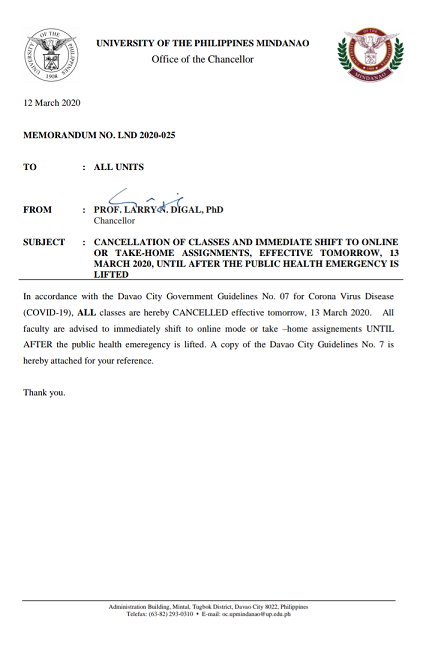
03 April 2020
Dear UP Mindanao constituents:
In the past two years, we have experienced major disruptions. Last year, we had to deal with the various earthquakes that hit Mindanao. This year, we—and the rest of the world—face another threat in the form of a pandemic caused by the coronavirus disease.
What disruptive events such as this pandemic teaches us is the importance of focusing on what really matters. And right now, during this difficult time, what the university is focusing on is taking care of its constituents, particularly our students, our teaching and nonteaching staff, and our non-UP contractual staff.
For our students, since classes were suspended on 17 March 2020, most of our 836 students have returned to their families. However, a few remain in the campus and in nearby residences (17 in the dorm, 27 outside) due to the distance to their hometowns or their family circumstances. For those remaining in campus, the Office of Student Affairs (OSA) is looking after their physical and mental wellbeing and is in close contact with their parents for updates on their situation. And for those who have gone home, OSA has also prepared a Student Monitoring Survey to check on the condition of our students, which has received 322 responses as of 6:00 a.m. on 3 April 2020.
I would like to extend my profound thanks to our alumni and constituents who generously shared their resources, both financial and in kind, so that the university can continue to take care of these stranded students by keeping them fed. Rest assured that as soon as travel outside Davao City and to other parts of the country are permitted, the university will make the necessary arrangements and provide assistance for these students’ safe return to their families.
For our teaching and nonteaching staff, most are now working from home in compliance with directives from the city government. The personnel who continue on-campus operations are the staff of the Office of the Chancellor, Office of the Vice Chancellor for Administration, the finance offices, the Elias B. Lopez Hall dormitory, as well as our transport personnel who ferry members of the staff from their residences to our campus and our security and janitorial personnel who have quarters on campus.
Our main priority right now is for the release of salaries and benefits to personnel to ease economic hardships during these trying times. We will also undertake a donation drive to augment the limited assistance we can give for the needs of our non-government service and project-based personnel.
Our staff who continue to report to work are our front liners. They are risking their health and wellbeing in the face of this lockdown to ensure that we receive our salaries and benefits in the midst of this pandemic. We appreciate and thank them for their service. It is because of them that most of us can carry on our functions in the comfort and security of our homes.
After taking care of our own, we need to remember that our work in the university does not grind to a halt just because classes are suspended. We are, after all, not only an institution of higher learning, but a research and public service university as well. Especially during times of crisis, we need to ask ourselves: What can we do for the country?
I would like to commend the Philippine Genome Center (PGC) Mindanao for their proposal to further enhance the diagnostic capability of the Davao Region. We are now working with the private sector and local government units to have this funded. The same goes to the researchers of the Department of Math, Physics, and Computer Science who are working with the Department of Science and Technology XI and the UP Resilience Institute to predict the spread of COVID-19 in the region and in Mindanao in order to inform the government’s key strategies.
Hopefully, more of our researchers can come up with ways to use their expertise to contribute in the fight against COVID-19 even within the restrictions of the quarantine.
For now, our campus academic oval is closed. Traffic is allowed only through the north road by the military camp and the south road through the Davao City-UP Sports Complex. The City Health Office did a disinfection of buildings and grounds by mist spraying last April 1.
So, the big question is “what now?” What happens when the quarantine in Davao City is lifted on April 19 (or extended or withdrawn earlier)?
As many have pointed out, the COVID-19 pandemic is a litmus test for a country’s health care system. It is also a test for the university’s health care amenities as well.
Our internal assessments have shown our weakness when it comes to our health care infrastructure in the university: we have inadequate healthcare personnel and facilities on campus. And we have been considering different medium- and long-term solutions to address this.
But in the immediate future when work and classes resume, our focus will be on setting sanitation protocols in place in line with recommendations from the Department of Health—i.e., mist sanitation of buildings, availability of sanitizers and handwashing soap, protective masks for our healthcare and other personnel, just to name a few.
Also, as people go back to the campus, identifying persons under monitoring (PUMs) and persons under investigation (PUIs) is crucial to safeguard the health of our employees. We are now studying mechanisms for self-reporting if one of our constituents is considered a PUM or PUI without, of course, violating existing data privacy laws—as details about one’s health is considered “sensitive information” and governed by strict guidelines for data collection and reporting. We are also working on better ways that we can disseminate to the public information and policies related to this disease.
As for details about resumption of classes, these matters are all coordinated at the System level, with inputs from all the CUs, and we are still awaiting decisions from the UP Board of Regents and the Office of the Vice President for Academic Affairs. The UP Mindanao Executive Committee already held a videoconference meeting to discuss these matters last 31 March 2020, and we are working on various contingency plans depending on different scenarios. So, I urge the members of our faculty to be active in discussing these important matters with your deans.
I also appeal to our teaching staff to take seriously the “blended learning” initiatives of the university. Since 2016, the Interactive Learning Center/Learning Resource Center (ILC/LRC) has been conducting seminar-workshops to promote this pedagogical approach that combines face-to-face teaching and computer-mediated learning; however, adoption of the approach has been very limited. Please use this time during the enhanced community quarantine to look at how we can improve our coursework syllabus for online delivery.
Given the global scope of the COVID-19 pandemic, various epidemiological models suggest that even if we contain the disease in our country, future incident clusters of the disease are likely to pop up due to imported cases as borders are opened once again. Hence, it is better to be prepared for potential interruption of classes in the near future.
We are aware that some of our teaching staff and many of our students might not have devices for use in online learning or have access to personal Internet connections. The Office of the Vice Chancellor for Academic Affairs has already coordinated with the colleges to conduct a survey so we will have a better picture of the situation and is working with the Information Technology Office to come up with a plan to mitigate this situation.
The disruption of the coronavirus disease will heavily affect many aspects of our society, and global policy experts predict that the fallout for this pandemic will be with us for years to come. Now more than ever, UP Mindanao needs to rise to the challenge in understanding various issues intrinsically linked to COVID-19 and other diseases that might threaten us in the future. Here are some ideas that come to my mind:
• For conservation biologist and environmental scientists – How can we better safeguard wildlife and their habitats to avoid transmission of disease from wild animals to humans in the future?
• For food scientists and scientists working in agriculture – How can we promote practices that contribute to food security, as well as provide safe food options in times of crisis?
• For economists and management scholars – What policies can we recommend post-COVID-19? How can we reboot our economy and help vulnerable communities such as small and medium enterprises after this pandemic?
• For social scientists and culture/communication scholars — What is the socio-cultural toll of events like this pandemic, and what can we do to help communities deal with this trauma?
I am certain that our community of scholars will perhaps have answers and, more importantly, will raise better questions. But I hope that we can all come together para sa bayan!
In the coming weeks, we will be issuing memos and guidelines through different communication channels on relevant policies and action plans to guide all of us as we prepare to tackle the rest of the current academic year and the incoming one.
Keep safe!
Sincerely,
Prof. Larry N. Digal, PhD
Chancellor



 Sa mga UPMin officials, faculty, staff, students sa pangunguna ng University Student Council (USC), Association of the UP Beta Sigma Fraternity & the UP Sigma Beta Sorority (Betans) at iba pang student organizations, All UP Academic Employees Union, All UP Academic Employees Union-Mindanao, UP Mindanao Alumni Association (UPMinAA), UP Alumni Association-Davao Chapter (UPAA-Davao), UP Mindanao Foundation (UPMFI), at iba pang mga nakibahagi sa aming munting bayanihan para sa ating mga estudyante na kasalukuyang natigil sa Elias B. Lopez Hall dormitory at boarding houses dahil sa ipinatutupad na community quarantine sa siyudad ng Davao dulot ng panganib na dala ng COVID-19 ...
Sa mga UPMin officials, faculty, staff, students sa pangunguna ng University Student Council (USC), Association of the UP Beta Sigma Fraternity & the UP Sigma Beta Sorority (Betans) at iba pang student organizations, All UP Academic Employees Union, All UP Academic Employees Union-Mindanao, UP Mindanao Alumni Association (UPMinAA), UP Alumni Association-Davao Chapter (UPAA-Davao), UP Mindanao Foundation (UPMFI), at iba pang mga nakibahagi sa aming munting bayanihan para sa ating mga estudyante na kasalukuyang natigil sa Elias B. Lopez Hall dormitory at boarding houses dahil sa ipinatutupad na community quarantine sa siyudad ng Davao dulot ng panganib na dala ng COVID-19 ...  12 March 2020
12 March 2020